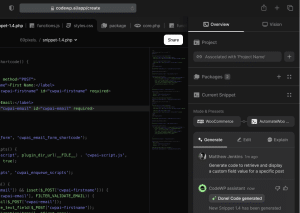You may have heard about WordPress's slow decline in recent years.
It's a bit unsettling.
But what do these numbers really mean? Is WordPress dying?
In this post, we’ll delve into the facts to uncover the truth behind these speculations.
How WordPress Became A Popular CMS
According to the latest data from W3Techs, WordPress powers 43.1% of websites on the internet. It’s a testament to how massive and influential the CMS platform truly has become.

Source: JoostdeValk
But did you know that WordPress was originally designed as a simple blogging tool?
Its humble beginnings can be traced back to 2003. Matt Mullenweg and Mike Little launched WordPress as a replacement for b2/cafelog.
The platform instantly gained popularity because of its extensive customization options and user-friendly interface. Developers and designers started contributing themes, plugins, and extensions to further enhance WordPress’ functionalities.
Over the years, it has evolved from a blogging platform to a full-featured CMS.
These are some of the platform’s well-known features:
- It’s SEO-friendly
- It’s easily customizable
- It’s highly scalable
- It offers more options than the other CMS platforms
- It has tons of free tutorials and documentation
- Support forums are available where anyone can ask, share, and learn
- It’s supported by a large community of experts
WordPress has also outgrown its biggest competitors like Joomla!, Drupal, and Shopify. Today, it's the backbone of the web. It runs two-thirds of all CMS websites and an estimated 36.28% of the top one million sites.
WordPress's success comes from its open-source nature. Developers, designers, and bloggers have all played a part in enhancing WordPress. It's flexible, catering to both beginners and tech experts. Users can start creating simple dynamic websites or customize them to their heart's content.
The introduction of WooCommerce in 2011, later acquired by Automattic in 2017, further propelled WordPress ahead of its competitors. WooCommerce has an impressive market share, too. This solidifies WordPress's position as a versatile and robust platform for both blogging and e-commerce solutions.
For us, it’s a platform that continues to meet the demands of the digital world.
Why WordPress’ Current Market Share is Shrinking
Let’s start by looking at the CMS usage statistics and CMS market share from W3Tech:


Based on the figures above, it’s evident that WordPress’ market share and usage have slightly declined or plateaued for the first time between 2022 and 2023.
Let’s unpack some of the possible reasons behind this trend and why some believe WordPress is slightly losing its edge.
1) Security Issues
WordPress runs more than 800 million websites on the internet, but its popularity comes with a downside. Hackers love targeting it.
According to Colorlib, about 13,000 WordPress websites are hacked daily. This is estimated to be 4.7 million sites per year.
A big part of the problem is that 49.8% of these infected sites were outdated.
WPHackedHelp points out some weak spots that hackers exploit. This includes using vulnerable web hosting, outdated plugins and themes, lack of two-factor authentication, and failing to update WordPress’ security settings.
While WordPress might be a common target of hackers, other CMS platforms aren't immune to security headaches either. WordPress's troubles just highlight the bigger picture of web security risks out there.
2) Gutenberg is Getting Lots of Hate
Based on these negative reviews, it’s clear that a lot of WordPress users were not quite happy with Gutenberg.
The Gutenberg editor marks WordPress’ significant shift from the classic editor. The purpose of this upgrade is to modernize and add flexibility to the previous editor.
However, a lot of users have found the block system cumbersome, especially for longer posts where each paragraph becomes a separate block. This can make the writing process feel disjointed.
Comparisons with established page builders have also highlighted Gutenberg's limitations. While it's a core WordPress feature, it lacks the advanced design capabilities and intuitive visual editing that many page builders offer. These issues have led to frustration among users who find Gutenberg less efficient for their needs.
The negative reception of Gutenberg reflects a broader trend of users seeking alternatives that better align with their workflow and performance expectations.
3) Rising Popularity of Website Builders
WordPress used to be the easiest way to get a website up and running. That was until website builders like Wix and Squarespace came along.
These newcomers shook things up with their drag-and-drop approach. They make website building easier for anyone, even those who've never written a line of code.
While these platforms might have a few limitations, they're perfect for those who want to build websites quickly and affordably for their personal use and small businesses.
4) Renewed Interest in Static Websites
Back in the early days of the internet, all websites used to be static.
Then, CMS-driven dynamic websites like WordPress became a hit.
But now, there's a shift back to basics. Static sites are in the spotlight again, thanks to their speed, security, and simplicity.
Currently, there are more than 100 static site generators built with languages like JavaScript, Go, Ruby, and Python.

Source: cloudcannon
However, these tools are still way behind WordPress in terms of popularity. Plus, they’re generally not friendly to non-developers.
But new solutions are popping up. For instance, platforms like Netlify and Vercel are simplifying the deployment process, while site builders like Webflow are offering intuitive interfaces that don't require coding skills. They’re on the rise and are becoming a practical choice for businesses and individuals alike.
WordPress Is Not Dead nor Is It Dying
Recent trends in market share have sparked debates about WordPress's future, with some suggesting it may be on the decline.
But is this really the case?
Opinions in the industry are divided. Joost de Valk from Yoast SEO advocates for substantial changes to reignite growth, while Alex Denning points out that the data can be interpreted in various ways.
At CodeWP, we're confident that WordPress isn't on the downturn.
Here are some of the solid reasons why we trust in its future trajectory.
1) Support From a Massive Community
WordPress is supported by a collective of passionate developers, designers, and users who drive the platform's growth. They're the force behind the endless stream of themes, plugins, and updates that keep WordPress at the cutting edge.
2) Versatility
WordPress has evolved far beyond its blogging roots. Now, it’s powering everything from small personal blogs to large e-commerce sites and even applications. Its flexibility allows users to create virtually any type of website, a level of adaptability that's hard to find elsewhere.
3) Flexibility
WordPress's interface caters to all levels of expertise. It is accessible to beginners, yet robust enough for developers to dig deep and customize. This balance between simplicity and power is a key factor in its enduring popularity.
4) Google Loves WordPress
According to Sebastiaan van der Lans, Google favors WordPress because it's built to communicate well with search engines. WordPress sites use clear markup language that Google understands easily, helping it index content quickly.
Plus, the Gutenberg editor automatically handles the technical stuff, so your content is ready for Google right off the bat. This means better visibility in search results, all without needing to be a coding expert.
5) Large Businesses and Organizations Trust WordPress
WordPress powers not just small-scale sites but also high-profile businesses and organizations. This includes giants like TED, Disney, the White House, and the New York Times. It's a solid proof that WordPress's performance and scalability are top-quality.
The Future of WordPress
WordPress is gearing up for a future centered around collaboration and user experience.
According to Matias Ventura, the CMS platform is now entering its third phase of development. Users will soon be able to edit content simultaneously without conflicts and enjoy features like draft sharing, inline commenting, and improved version control.
Here’s a list of the features they’re planning to add:
- Real-time collaboration: Teams can create and refine content and design within the WordPress block editor without any editing conflicts.
- Asynchronous collaboration: This feature will empower users and teams to collaborate on projects at their own pace to accommodate diverse workflows.
- Publishing flows: This encompasses the comprehensive steps and requirements for content creation, from drafting to publishing, including editorial standards, customized goals, and task prerequisites.
- Post revisions interface: This allows users to schedule revisions across different parts of their website, including coordinated updates for events or campaigns. The new feature also addresses theme switching flows and scheduling through the use of block templates and styles.
- Admin design: This feature focuses on modernizing navigation and enhancing user flows, particularly for plugins.
- Global search and command component: This enhances navigation and allows for prompt-based AI tool integration by plugin authors.
Another update worthy to be mentioned here is the evolution of the JavaScript-built Gutenberg editor. Some of its key enhancements include full site editing, block locking, and a new navigation block to enrich the user experience.
Gutenberg's reach has also expanded. Platforms like Drupal and Tumblr are even adopting its block-based system. We believe this growth serves as a cornerstone in modern content creation.
With these enhancements on the horizon, there's every reason for us to be excited about the platform's direction and potential.
WordPress Will Continue to Thrive With AI
WordPress is one of the many platforms that has embraced AI to stay not just competitive, but a leader in the digital space.
Several AI plugins & tools, including CodeWP, are already at the forefront of developing algorithms capable of generating code snippets, content, insights, and many others. Platforms like Divi and Elementor even give users access to an AI assistant to help build the perfect website for their needs.
So, what does this all imply?
It's clear that WordPress is here to stay.
As AI evolves, WordPress is not only keeping pace but is also leveraging these advancements to enhance its platform.
Contrary to what some might suggest, WordPress is thriving, continually adapting, and integrating cutting-edge AI technology to remain the most popular CMS platform on the internet.
Is WordPress Dying - Our Final Thoughts
The notion that WordPress is dying is far from the truth.
Despite facing challenges, WordPress continues to be the go-to CMS platform, beloved by a vast community for its open-source nature, user-friendliness, extensive plugin support, and scalability.
The future of WordPress looks bright, too, with AI playing a pivotal role in its ongoing growth and success.
With all that being said, it’s clear that WordPress’ journey is far from over. We’re pretty sure that it'll continue to dominate the digital landscape for many years to come.
We hope this post reassured you that WordPress is alive and well.
What are your thoughts on the idea that WordPress is dying? Please share your opinions in the comments below.










